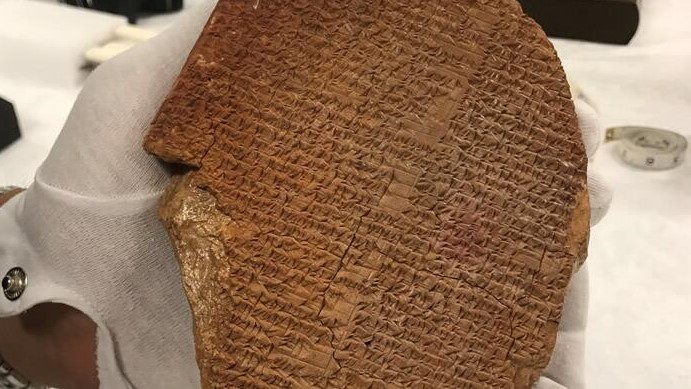US to return 'priceless' 3,500-year-old Epic of Gilgamesh tablet to Iraq 30 years after it was stolen
The priceless artifact shows part of an ancient Akkadian poem.

Get the world’s most fascinating discoveries delivered straight to your inbox.
You are now subscribed
Your newsletter sign-up was successful
Want to add more newsletters?

Delivered Daily
Daily Newsletter
Sign up for the latest discoveries, groundbreaking research and fascinating breakthroughs that impact you and the wider world direct to your inbox.

Once a week
Life's Little Mysteries
Feed your curiosity with an exclusive mystery every week, solved with science and delivered direct to your inbox before it's seen anywhere else.

Once a week
How It Works
Sign up to our free science & technology newsletter for your weekly fix of fascinating articles, quick quizzes, amazing images, and more

Delivered daily
Space.com Newsletter
Breaking space news, the latest updates on rocket launches, skywatching events and more!

Once a month
Watch This Space
Sign up to our monthly entertainment newsletter to keep up with all our coverage of the latest sci-fi and space movies, tv shows, games and books.

Once a week
Night Sky This Week
Discover this week's must-see night sky events, moon phases, and stunning astrophotos. Sign up for our skywatching newsletter and explore the universe with us!
Join the club
Get full access to premium articles, exclusive features and a growing list of member rewards.
A $1.7 million, 3,500-year-old, clay tablet recounting a part of the world's oldest-known story will be returned to Iraq by the U.S. on Thursday (Sept. 23) after being seized from the company Hobby Lobby.
The so-called "Gilgamesh Dream Tablet," inscribed with a portion of the "Epic of Gilgamesh," one of the world's oldest-known religious texts, was looted from an Iraqi museum after the start of the Gulf War in August 1990, before "fraudulently" entering the U.S. art market in 2007, according to UNESCO, the United Nations' cultural agency.
The arts and crafts retail chain Hobby Lobby purchased the tablet in a 2014 auction — intending to display it in its billionaire owner Steve Green's Museum of the Bible in Washington, D.C. But the U.S. Department of Justice seized the object in 2019, announcing in July 2021 that it would order the tablet's official handing over as the artifact had entered the country "contrary to federal law."
Related: In photos: Treasures of ancient Mesopotamia
The tablet, which will be handed over to Iraqi officials at the Smithsonian Institution, is among 17,000 ancient artifacts set to be returned, many of which were looted and smuggled out of the country following the 2003 U.S. invasion.
"By returning these illegally acquired objects, the authorities here in the United States and in Iraq are allowing the Iraqi people to reconnect with a page in their history", Audrey Azoulay, UNESCO's director-general, said in a statement. "This exceptional restitution is a major victory over those who mutilate heritage and then traffic it to finance violence and terrorism."
War has created a significant global increase in the destruction of cultural heritage over the last ten years, according to Interpol, with traffickers smuggling illegally acquired artworks out of conflict zones to sell them for eye-watering sums.
Get the world’s most fascinating discoveries delivered straight to your inbox.
Originating as a series of five Sumerian poems about the adventures of the mythological hero Gilgamesh, the "Epic of Gilgamesh" was stitched together into a 12-tablet Akkadian language epic decades, or even centuries, later. The story tells of how Gilgamesh, the philandering king of Uruk, battles with, and later befriends, a giant; he then feuds with the gods, and embarks upon a quest to conquer death.
Part of the epic story was first discovered in 1853 among the ruins of the ancient Mesopotamian Library of Ashurbanipal in Nineveh (now northern Iraq), and its cryptic cuneiform text was first translated by George Smith. The part of the story Smith translated described a great flood, a ship anchored atop a mountain and a bird sent out to search for dry land. Smith was so thrilled by the story that he reportedly tore off his clothes in excitement.
Smith’s discovery of a flood story so similar to the biblical Noah's Ark caused a sensation, and he was soon sent back to dig up the missing pieces of the tablet. The fragments he found completed the flood story, and, for the most part, the "Epic of Gilgamesh."
The Gilgamesh Dream Tablet is so named because it contains a segment of the epic in which Gilgamesh recounts his dreams to his mother, the Sumerian goddess Ninsun. The tablet is one of many thousands of smuggled artifacts surrendered to federal authorities by Hobby Lobby, which was also forced to pay a $3 million fine.
"We should have exercised more oversight and carefully questioned how the acquisitions were handled," said Hobby Lobby's Green at the time of the tablet's seizure.
The Iraqi culture minister, Hassan Nadhem, remarked in a speech that this restitution of artifacts was "unprecedented."
"This is the largest return of antiquities to Iraq," said Nadhem, "[It is] the result of months of efforts by the Iraqi authorities in conjunction with their embassy in Washington."
Originally published on Live Science.

Ben Turner is a U.K. based writer and editor at Live Science. He covers physics and astronomy, tech and climate change. He graduated from University College London with a degree in particle physics before training as a journalist. When he's not writing, Ben enjoys reading literature, playing the guitar and embarrassing himself with chess.
 Live Science Plus
Live Science Plus










